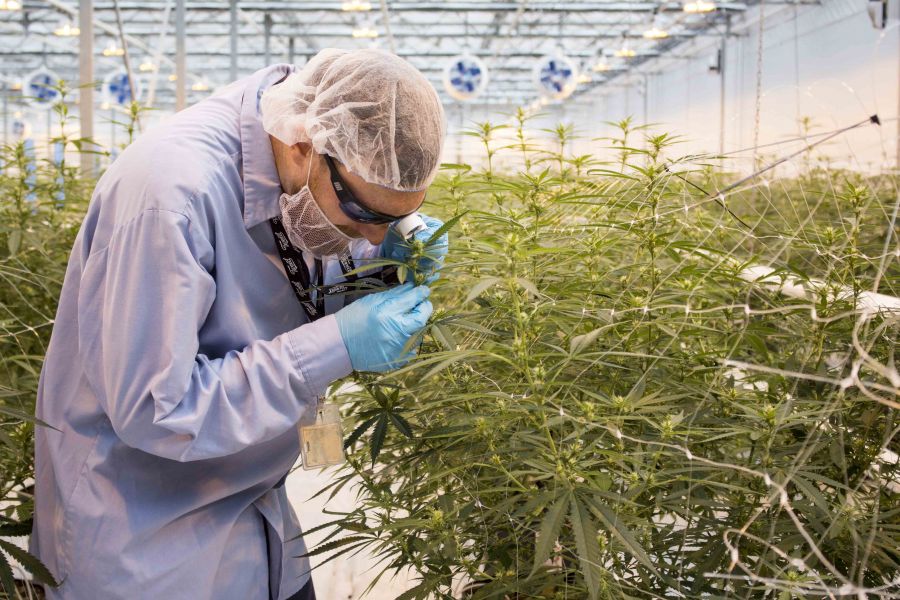With the legalization of marijuana approaching in Canada, farming communities such as Niagara-on-the-Lake could face a number of challenges with regards to legal marijuana grow operations.
There are several potential problems residents and councillors wish to address, such as the smells wafting from production factories affecting neighbouring home, the potential for loss of diversity in Niagara’s fruit farming land if more greenhouse facilities open up, and further complications if the provincial government allows for a private market.
Niagara-on-the-Lake has already seen many of its peach orchards replaced with grape vines, as wineries and distilleries become increasingly popular in the region, and some fear when cannabis is legalized it will could wind up the same.
The potential for Niagara-on-the-Lake to become a tourist spot for pot is a real one, said Coun. Betty Disero.
She said figuring out exactly what power municipalities will have to decide their own fate with regards to controlling production facilities will depend largely on provincial standards, which have yet to be determined in some cases, and are likely to evolve based on what works and what doesn’t.
Jordan Sinclair, vice-president of communications at Tweed Farms, which is currently gearing up for the recreational cannabis market, said he isn’t aware of any competitors coming into town just yet, but that it “wouldn’t surprise” him.
“There have been some areas in the country where you see one person open up shop and a second producer will follow in behind,” he said.
“One of the big hurdles you have to clear is to make sure you’ve got a community where there’s some buy-in — so if town council for example is already experienced with cannabis producers, they’re less likely to have stigma and less likely to say no right out of the gate.”
He said the provincial election also makes things “interesting” for places like Tweed, with new potential for private retail in the province.
“Right now obviously the plan in Ontario is to have the Ontario cannabis stores, and there’s going to be 40 of them, but Premier Ford has said that he’s open to consultation to maybe including the private sector,” Sinclair said.
He said if that were to happen, Tweed could be able to “sell from the production point,” similar to how craft breweries operate.
“Imagine a case where someone is doing a winery tour, and then one of the stops on that winery tour is also at a cannabis grow-op,” he said.
When asked how that could be bad for driving or bike tours, he joked that “maybe we’ll have to get them a bus.”
When Tweed first set up shop in NOTL, things were a bit different, Sinclair said.
“In 2014, the climate — and I’m talking the political and social climate — was not what it is now. A lot has changed in the last four years with regards to cannabis production and cannabis producers.”
Part of the decision to come to Niagara-on-the-Lake was because Canopy Growth purchased a facility that was already here, which was in the midst of trying to acquire a licence and had yet to do so, he said.
“Part of it just came down to pure availability of options, because the options were very limited at that time. There weren’t a lot of communities or a lot of facilities where you could even pursue this and have any type of social buy-in.”
Other factors, he said, were more “specific to the region itself.”
“And that was largely because the climate is so good down there. Obviously people know (NOTL) as wine country, and for us, those conditions leaned themselves really well to cannabis production.”
When the first greenhouse opened, it didn’t have supplemental light or shade curtains for climate control, “it was just pure greenhouse,” Sinclair said.
Now, he said the company could operate just about anywhere in the province.
“We’ve got a level of climate control, and we’ve got a level of shade control and things that basically recreate nature for us,”
Disero said if operations can open anywhere in the province, she hopes they won’t come into Niagara-on-the-Lake just to open up a greenhouse in wine country.
With Tweed, which has developed a partnership with Niagara College, Sinclair said the company has “become part of the community now.”
“We’re a member of the Chamber of Commerce, we try to be involved as much as we can with other stakeholders, we’ve got a partnership with the local college down there (Niagara College) and that allowed us to feel the confidence to be able to expand a bunch.”
The company is currently expanding its production from about 350,000 square feet to one million, and being in the middle off a “massive” expansion right now, doesn’t have anything planned with regards to an outdoor expansion.
There currently is no need for outdoor growing at Tweed, with the greenhouse having climate controls that allows for multiple crops per year.
“We’ll get through tripling, and then we’ll see if there’s another phase of expansion after that,” he said. “But we’ve got a hub here now.”
Disero hopes to protect the town’s agriculture if she ends up winning the municipal election as lord mayor, as well as make sure operations aren’t interfering with residents. Her main concern, she said, is the smell.











